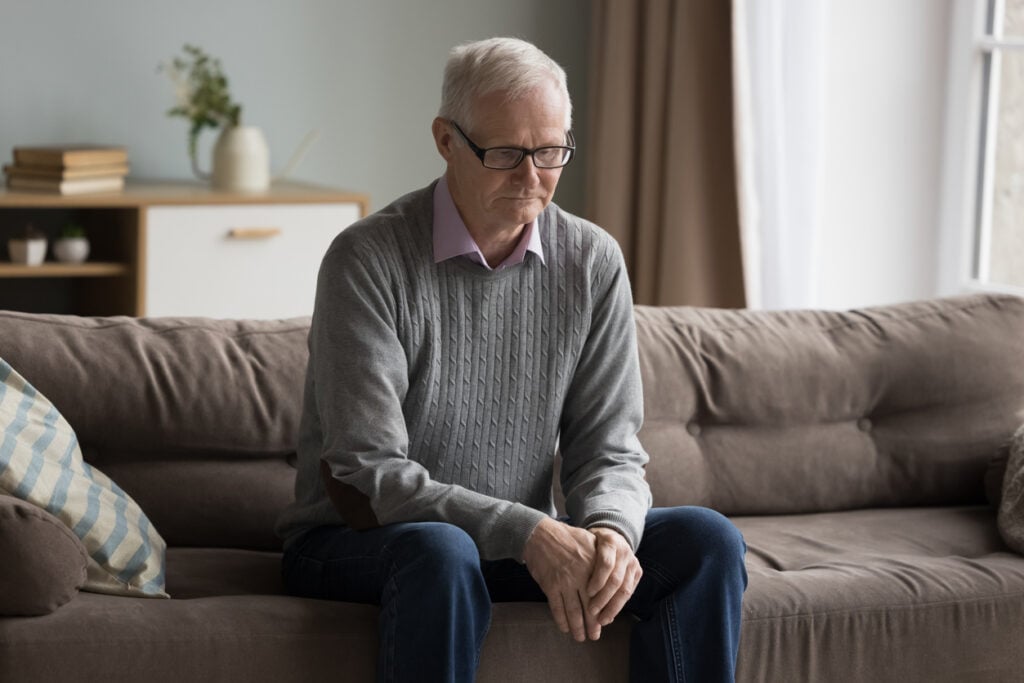Even the most outgoing spouse can retreat into silence after life delivers a few hard blows.

You might remember when your spouse was the life of the party—the one who made friends easily, cracked jokes at family gatherings, and loved being out in the world. But lately, something has changed. They’ve pulled back, avoided social outings, and seem less like the person you’ve always known. It’s easy to assume they’re just getting older or that their personality is shifting naturally, but often, a deeper reason is at play.
Life has a way of wearing people down, and certain experiences can leave even the most social person feeling disconnected. Whether it’s grief, health struggles, or a loss of purpose, these challenges can take a toll on their confidence, energy, and outlook. If you’ve noticed your spouse withdrawing, it’s not necessarily about you—it might be about the weight of what they’ve been carrying.
Here are some tough experiences that can change a senior spouse, even if they were once the most outgoing person in the room.
1. Losing a close friend or family member can make them retreat.

Grief is a heavy burden, and for many seniors, losing close friends or family members is an unfortunate reality. When someone they’ve known for decades passes away, it’s more than just saying goodbye—it’s a reminder of their own mortality, of time slipping away, and of a world that no longer looks the same, says Kelly Kowalchuk, MSW, LCSW in an article for the Center for Grief and Trauma Therapy.
For an outgoing spouse, grief can make socializing feel meaningless or exhausting. They may withdraw not because they don’t want to connect, but because they don’t know how to return to normal when a piece of their life is missing. The best thing you can do is be patient, listen when they’re ready to talk, and remind them that their pain is seen.
2. Chronic pain or declining health can steal their energy.

When someone is in constant pain or dealing with ongoing health issues, even the most vibrant personality can start to dim. It’s hard to stay upbeat when every movement hurts or when doctor’s appointments become the new normal.
Instead of being social, they may start conserving their energy just to get through the day, according to research by Pamara F. Chang, et al., published by the National Institute of Medicine. This withdrawal isn’t about losing interest in people—it’s about prioritizing comfort. Encouraging them to seek treatment, offering support without pushing, and adapting social plans to their needs can help them feel less isolated.
3. Retirement can leave them feeling lost and without purpose.

Many people dream of retirement, picturing endless free time and relaxation. But when the routine and identity that came with a career disappear, some struggle with a deep sense of purposelessness, says Melanie Donohue, LCSW, in an article for Blue Moon Senior Counseling. Work provided structure, social connections, and a reason to get up every morning—without it, some seniors feel unmoored.
A once-outgoing spouse might withdraw because they no longer know where they fit in the world. Encouraging them to explore new hobbies, volunteer, or find part-time work can help them reconnect with a sense of meaning. It’s not about replacing their job—it’s about giving them something to look forward to again.
4. Feeling like they’re being left behind by the world can be isolating.

The world moves fast, and for seniors, it can sometimes feel like they’ve been left behind. Technology, social norms, and even family dynamics shift, and suddenly, they’re struggling to keep up. When conversations revolve around things they don’t understand or feel excluded from, withdrawal can be a defense mechanism, as evidenced by research by Alexander Seifert, PhD, et al., and published by the National Library of Medicine.
Your spouse might not say it outright, but they could be avoiding social settings because they feel out of place. Encouraging open discussions, helping them stay engaged in the changing world, and reminding them that their perspective is still valuable can help them regain their confidence.
5. Financial stress can make them feel ashamed and withdrawn.

Money worries don’t disappear with age—in fact, they often become more pressing. Whether it’s dwindling retirement funds, unexpected medical expenses, or rising costs, financial stress can weigh heavily on a senior spouse.
If they’ve become withdrawn, it might not be because they’ve lost interest in socializing, but because they don’t want to face questions about their lifestyle changes. Financial struggles can feel embarrassing, especially for those who were once the providers. Offering reassurance, brainstorming solutions together, and removing shame from the conversation can help ease their burden.
6. A loss of independence can make them feel like a burden.

Losing the ability to drive, handle home repairs, or manage day-to-day tasks can be a blow to a person’s confidence. When someone has spent their whole life being independent, needing help—even from a loving spouse—can feel like losing a part of their identity.
Rather than ask for assistance, they may retreat into themselves, avoiding situations that highlight what they can no longer do. Helping them find new ways to maintain independence, even in small ways, can restore some of their confidence and keep them engaged.
7. Depression in older adults is often overlooked but very real.

Many seniors experience depression, but it often goes unnoticed because it doesn’t always look like sadness—it can look like disinterest, irritability, or withdrawal. If your spouse has lost motivation, seems uninterested in things they used to enjoy, or isolates themselves more and more, depression could be at play.
It’s not just about cheering them up—it’s about recognizing that their withdrawal may be rooted in something deeper. Encouraging open conversations, seeking professional support, and showing them that they’re not alone can make a difference.
8. Past regrets and unresolved emotions can resurface later in life.

As people age, they often reflect on their past—both the good and the painful. Regrets about relationships, missed opportunities, or past mistakes can weigh heavily, leading to withdrawal. Instead of enjoying the present, they may get lost in “what ifs” and “should have beens.”
Talking about the past isn’t always easy, but allowing space for those emotions, rather than dismissing them, can be healing. Encouraging them to share their stories—without judgment—can help them process emotions and reconnect with the present.
9. Fear of becoming a burden can make them pull away.

Many seniors worry about becoming a burden to their spouse or family. If they start needing more help or feel like they’re slowing you down, their instinct might be to withdraw rather than risk being seen as “too much.”
Reassuring them that they are still valued and that love isn’t about keeping score can help. Instead of making them feel dependent, finding ways to balance support with their independence can make them feel like a partner, not a burden.
10. Relationship changes can make them question their role.

Long-term relationships evolve, and sometimes, couples grow in different directions. If a spouse feels emotionally disconnected or like their role in the relationship has shifted in an unfamiliar way, they might retreat rather than address it directly.
Checking in regularly, having honest conversations, and making an effort to reconnect can help bridge the gap. It’s not always about fixing something—it’s about making sure both people still feel seen and valued.
11. A lack of social opportunities can make withdrawal feel like the only option.

Some seniors withdraw simply because they don’t have as many opportunities to connect with others. Friends move away, family gets busy, and social circles shrink. What starts as unintentional isolation can turn into a habit of staying home and keeping to themselves.
Finding ways to expand their social life—joining a community group, reconnecting with old friends, or trying new activities—can help. Sometimes, all it takes is a gentle push to remind them that they still have a place in the world beyond their four walls.
